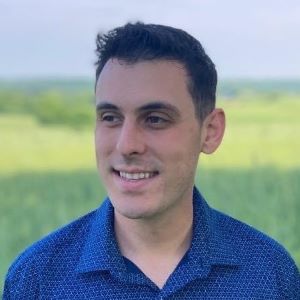
Michael B
Managing Full-Time College: Michael B
In my first two years of high school, academics came easily to me and I was an honors student. As a member of the National Honor Society, National Technical Honor Society, and student council, my future looked bright. I made plans to major in computer science in college.
However, during my junior and senior years of high school, I started struggling academically and losing interest in the hobbies I had always enjoyed. I began experiencing extreme anxiety and alternated between sleeping hours on end and being unable to sleep for days at a time. My teachers, family, and friends began to notice something was different, but they did not know what it was. At the time, no one in my life realized this was the beginning of my journey into the world of mental illness.
Eu mal consegui me formar no ensino médio. Felizmente, devido às minhas realizações acadêmicas anteriores, eu já havia sido aceito no College of the Ozarks com uma bolsa integral.
Em 2016, durante meu primeiro semestre de faculdade, experimentei meus primeiros delírios e sentimentos de paranóia. Eu pensei que meus professores estavam contra mim. Eu acreditava que mensagens subliminares estavam sendo transmitidas pela TV e pelo rádio. Eu tinha dificuldade para dormir e não conseguia acordar a tempo para as aulas. Quando eu fazia o dever de casa, eu me via lendo o mesmo texto várias vezes sem compreensão.
Incapaz de me concentrar, matei minhas aulas e me isolei em meu quarto. Eu não conseguia entender por que as tarefas escolares haviam se tornado tão difíceis. Fui reprovado nas aulas e voltei para casa naquele verão confuso e desanimado.
Over the course of the next several months, my mental health continued to decline. I wasn’t sleeping and I experienced cognitive issues. I began having visual, auditory, and tactile hallucinations: hearing voices and experiencing extreme fear. I was no longer able to study or work. My parents sought treatment for me, and in November 2016 I was diagnosed with schizoaffective disorder.
We tried numerous medications and treatment options for improved cognition and anxiety control: clean eating, gluten and dairy free foods, supplements, vitamins, and holistic and naturopathic medicine. Nothing worked. Finally, in my desperate and confused state, I believed that more medication might work better to relieve my symptoms, and I took a two-week supply of medicine all at once. This resulted in me being picked up by ambulance and hospitalized with multiple organ failure. This was my fourth and last hospitalization.
After 13 failed antipsychotics, numerous mood stabilizers and antidepressants, and four hospitalizations, my parents finally found a doctor who was unwilling to give up on me. This doctor started me on a rarely used medication called clozapine, for treatment-resistant patients.
On clozapine, my concentration and memory began to improve. I began to experience less anxiety and fear and I started to enjoy old hobbies like reading. Over several months, the delusions, hallucinations, and voices faded away. As these schizophrenia symptoms began to fade, my cognitive abilities slowly improved. I enrolled in community college and each semester proved a little easier than the last.
I have now been in meaningful recovery for five years. I am back at my previous college, which is three and a half hours away from home, and I am living in a dorm on campus again. I work 15 hours a week in the campus library. I have made friends and am enjoying college life. My grades are excellent.
In 2019, I founded a NAMI peer support group in my hometown for people living with mental illness (NAMI stands for National Alliance on Mental Illness). In 2020, I started a NAMI on-campus support group for the Metropolitan Community College of Kansas City. I am a board member of NAMI of Greater Kansas City and the program director for all NAMI on-campus groups in Kansas City colleges. I have been arranging Zoom meetings, and people from all over the United States attend virtually. I was featured on the PBS Documentary, “The Hidden Pandemic.”
Recentemente, mudei meu curso de ciência da computação para serviço social. Após a formatura, quero trabalhar na área de saúde mental. Acredito que as pessoas que vivem com doenças mentais precisam de ajuda, esperança e compreensão, e quero trabalhar com os pacientes para melhorar suas vidas. Quero que saibam que a recuperação é possível com a medicação certa e que não estão sozinhos.
Espero que, ao compartilhar minha história, mais jovens busquem tratamento adequado para que possam reconstruir suas vidas como eu.
Isenção de responsabilidade: Os sobreviventes da esquizofrenia não são representantes da Fundação CURESZ.

